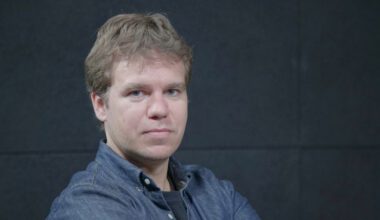Today we speak with Sandra Velasco, who, before joining Mercado Libre, worked at Uber where she launched operations in new markets, developed the onboarding system for drivers and the driver funnel in Latin America, and launched products like the UberFleet app. In addition, she collaborated with a social impact Venture Builder in Mexico. She was also an entrepreneur in China, was part of Start-Up Chile, and later ran a social venture in Chile.
What is your current role in Mercado Libre’s fintech area, and how does it align with the company’s overall strategy in the region?
Currently, I’m part of the Corporate Development team at Mercado Libre, focusing on Fintech and AI. We are in charge of three main areas:
- Business Development
- CVC Investments
- Mergers and Acquisitions (M&A)
Although our team operates across LATAM, my primary focus is on Mexico and Colombia.
In Business Development, I support teams in the ideation, development, and negotiation of strategic agreements that have a regional impact or involve multiple business units. I also lead strategic projects that bring innovation or strengthen the core business in each market.
From MELI Fund (our CVC fund), we invest in startups that solve problems in the financial ecosystem and amplify Mercado Libre’s mission of democratizing commerce and financial services in LatAm. Through these investments, we seek strategic synergies that allow us to co-create solutions with a tangible impact on financial inclusion. The fund’s investments range from $150k to $1M for Series A and B, although our opportunity fund allows for larger investments of up to $20M in strategic cases.
In M&A, we lead the analysis, negotiation, and closing of potential acquisitions.
What features or innovations do you prioritize when looking for startups that could add value to Mercado Libre?
The team is key. We value the authenticity of the founders and their ability to deeply understand the problems they are solving. Scalability and sustainability are also essential; we look for solutions that not only work today but can also adapt and grow with the market.
From a synergistic perspective with Mercado Libre, we are particularly interested in innovations that improve the end-user experience, such as simplifying processes, personalizing services, or enhancing security and transparency. We also look for solutions that bring efficiency to our business and align with our priorities, or technologies that enable us to launch new products or services that integrate with what we already offer, such as cryptocurrency trading or remittance services.
The areas or services we aim to enhance through investments constantly change. Throughout the year, we collaborate with business unit leaders to understand their roadmaps, strategic priorities, and areas of opportunity.
As investors, we focus on startups where we know we can provide strategic value. We believe the most powerful investment is one where we can maximize current potential and create a win-win situation, whether through a commercial contract with Mercado Libre or by connecting companies with our technology leaders who can offer their expertise to the founders, among other things.
We evaluate startups from several angles: their strategic alignment with our objectives, the quality of the team and their ability to execute, and their potential market impact. We are not looking for instant unicorns, but for solutions that can evolve and grow alongside us.
Flexibility and adaptability are crucial, especially when collaborating or integrating with a giant like Mercado Libre. While we maintain an entrepreneurial spirit, we sometimes face the bureaucracy of being a public company. However, when we achieve synergies with the startups we invest in, the results are impressive.
A success story is Felix Pago, a Mexican-American fintech founded by a Venezuelan and a Mexican, in which we invested and partnered to launch our remittance product. Thanks to our collaboration, Felix Pago has integrated its services directly into our platform, benefiting both sides. This partnership has allowed us to learn from each other and improve our offerings.
What is your perspective on the impact of fintech on financial inclusion and economic development in LatAm? What trends do you expect to see in the coming years?
Fintechs are revolutionizing financial inclusion in Latin America, and Mexico is one of the most dynamic markets. With over 500 fintechs, Mexico is the second-largest ecosystem in Latin America. The high penetration of mobile phones, over 90%, contrasts with 42% of the population lacking access to a bank account, creating a significant opportunity for mobile financial services. Currently, more than 60% of fintechs in Mexico focus on these services.
I believe we will see digital players continue to modernize and improve what traditional companies have offered for years. From cross-border payments with crypto, like Ripio, to remittances via WhatsApp, like Felix Pago. At Mercado Pago, we are committed to offering a digital payment ecosystem that facilitates financial inclusion and economic development, from service payments and online purchases to remittances and loans.
Finally, financial education will be a key area of impact. With only 32% of adults in Mexico having some level of financial education, fintechs like Mercado Pago have developed tools to teach users how to better manage their personal finances. This trend not only empowers users to make more informed decisions but also drives the adoption of digital financial products.
What are the biggest opportunities and challenges when large corporations like Mercado Libre collaborate with fintech startups in LatAm?
The biggest opportunity lies in combining the agility and innovation of startups with the scale and resources of large companies like Mercado Libre. Together, we can create solutions that we could not develop separately. However, the main challenge is balancing speed and control. Large corporations tend to have more structured processes, which can slow down the agility of startups. It is crucial to collaborate in a way that allows startups to maintain their pace and creativity while aligning with the company’s strategic objectives. Open and constant communication is essential to managing expectations and maximizing the potential of the partnership.
One of the most important lessons is the importance of communication and transparency from the beginning. At MELI Fund, we are sometimes the first to tell an entrepreneur that we might not be the right strategic partner for them. If we cannot add significant value, it is better for them to seek another source of investment. Setting clear expectations and being honest about timelines and what is expected from the integration is key to avoiding frustration on both sides.
As an investor, it is crucial not to get carried away by the excitement of the moment. Even if an opportunity seems irresistible, as a CVC, we must be very honest about whether it is truly strategic for both parties. Without this clarity, it is difficult to generate a virtuous synergy.
A superpower we have at Mercado Libre is our technological experience. Although sometimes we would like to invest as if we were a traditional fund, I believe that the real value we can bring goes far beyond the investment. For example, a few years ago, we started implementing a technological due diligence process in the startups we plan to invest in. We involve our technology team to work directly with the startup’s CTO, evaluating their technology and providing recommendations. This not only helps us identify opportunities but also offers the startup valuable feedback to improve and secure exponential growth. I recommend other CVCs identify and leverage their core expertise to provide real value to the ventures they invest in.
Additionally, it is crucial to involve the company’s executives from the start. At Mercado Libre, our investment committee includes the C-level, ensuring that any investment we make is aligned with our strategic objectives and that synergies are genuinely met and prioritized.
What advice would you give to fintech entrepreneurs looking to enter or grow in the Latin American market?
Know your market and your end user deeply. Latin America is a diverse region, and what works in one country does not always work in another. Be agile, but also patient; building a sustainable business takes time. Seek smart money and strategic alliances that allow you to scale faster and learn from those who have already traveled the path. Don’t be afraid to adjust your vision if the market requires it; flexibility is one of the greatest competitive advantages for a startup.
How can entrepreneurs who believe they could be a good fit for Mercado Libre get in touch?
The most direct way is through the form on the MELI Fund website. Although we receive a lot of deal flow from other funds and direct connections, the form is helpful when it is difficult to reach us through other means. However, most of the time, opportunities come through intros from someone else.
In Business Development, we are also very proactive. We actively seek opportunities, both for M&A and other business areas. If an entrepreneur wants to reach out, LinkedIn is a good option to connect with us.
This post is also available in: Español (Spanish)



